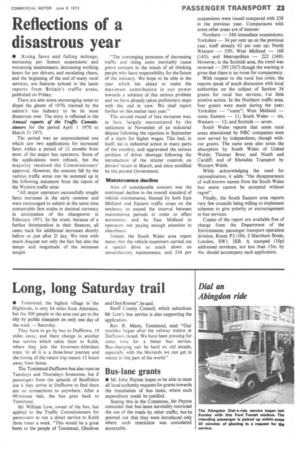Reflections of a disastrous year
Page 25

If you've noticed an error in this article please click here to report it so we can fix it.
• Rising fares and falling mileage, increasing psv licence suspensions and worsening maintenance, decreasing working hours for psv drivers, and escalating chaos, and the beginning of the end of many rural services, are features echoed in the latest reports from Britain's traffic areas, published on Friday.
There are also some encouraging notes to dispel the gloom of 1970, claimed by the nation's bus industry to be its most disastrous ever. The story is reflected in the Annual reports of the Traffic Commissioners for the period April 1 1970 to March 31 1971.
The period was an unprecedented one which saw two applications for increased fares within a period of 12 months from most of the major bus operators. Some of the applications were refused, but the majority received the Commissioners' approval. However, the concern felt by the various traffic areas can be summed up in the following statement from the report of the Western traffic area: "All major operators successfully sought fares increases in the early summer and were encouraged to submit at the same time comparable fare scales in decimal currency in anticipation of the changeover in February 1971. In the event, because of a further deterioration in their finances, all came back for additional increases shortly before or just after D day. We view with much disquiet not only the fact but also the tempo and magnitude of the increases sought. "The converging pressures of decreasing traffic and rising costs inevitably cause grave concern in the minds of all thinking people who have responsibility for the future of the industry. We hope to be able in the year which lies ahead to make the maximum contribution in our power towards a solution of this serious problem and we have already taken preliminary steps with this end in view. We shall report further on this matter next year."
The second round of fare increases was, in fact, largely necessitated by the settlement in November of an industrial dispute following the rejection in September of a claim for higher wages. This had, in itself. led to industrial action in many parts of the country, and aggravated the serious problem of driver shortage following the introduction of the stricter controls on drivers' hours in March, and since modified by the present Government.
Maintenance decline
Also of considerable concern was the continued decline in the overall standard of vehicle maintenance, blamed by both East Midland and Eastern traffic areas on the tendency to extend the interval between maintenance periods in order to effect economies, and by East Midland to operators not paying enough attention to cleanliness.
Indeed. the South Wales area report states that the vehicle examiners carried out a special drive to crack down on unsatisfactory maintenance, and 334 psv suspensions were issued compared with 238 in the previous year. Comparisons with some other areas are of interest: Northern — 340 immediate suspensions; Yorkshire — 34 per cent up on the previous year, itself already 62 per cent up; North Western — 529; West Midland — 168 (145); and Metropolitan — 222 (169). However, in the Scottish area, the trend was reversed — 295 (367) though the warning is given that there is no room for compacency.
With respect to the rural bus crisis, the reports speak of much discussion with local authorities on the subject of Section 34 grants for rural bus services, tut little positive action. In the Northern traffic area, four grants were made during the year; Yorkshire — "some"; West Midland— none; Eastern — 11; South Wales — six, Western — 12; and Scottish — seven, South Wales reports that some rural areas abandoned by NBC companies were now served by independents, though without grants. The same area also notes the absorption by South Wales of United Welsh; Thomas Bros; and Neath and Cardiff; and of Rhondda Transport by Western Welsh.
While acknowledging the need for rationalization, it adds: "the disappearance of well-known names from the South Wales bus scene cannot be accepted without regret".
Finally, the South Eastern area reports very few councils being willing to implement schemes to give priority or encouragement to bus services.
Copies of the report are available free of charge from the Department of the Environment, passenger transport operation division, Room P2/104, 2 Marsham Street, London, SW1 3EB. A stamped (lop) addressed envelope, not less than 13in. by 9in. should accompany each application.




































































































